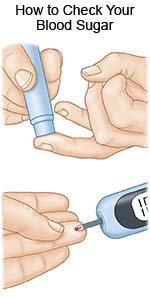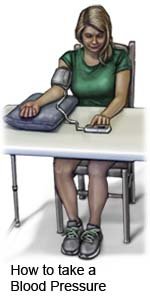Diabetic Kidney Disease
Medically reviewed by Drugs.com. Last updated on Nov 3, 2024.
Diabetic kidney disease (DKD) is the gradual and permanent loss of kidney function. This occurs because of kidney damage caused by high blood sugar levels. Normally, the kidneys remove fluid, chemicals, and waste from your blood. These wastes are turned into urine by your kidneys. DKD may worsen over time and lead to kidney failure.
DISCHARGE INSTRUCTIONS:
Call your local emergency number (911 in the US) or have someone call if:
- You have a seizure.
- You have sudden chest pain or shortness of breath.
Seek care immediately:
- Your heart is beating faster than normal for you.
- You are confused and very drowsy.
Call your diabetes care team provider if:
- You suddenly gain or lose more weight than your care team provider has told you is okay.
- You have itchy skin or a rash.
- You have nausea and repeated vomiting.
- You have fatigue or muscle weakness.
- You have an increased need to urinate, burning or pain when you urinate, blood in your urine, or strong odor to your urine.
- You have questions or concerns about your condition or care.
Medicines:
- Medicines may be given to lower your blood sugar level. Medicines may also be given to lower your blood pressure or get rid of extra fluid. Blood pressure medicines can help slow the loss of kidney function.
- Take your medicine as directed. Contact your healthcare provider if you think your medicine is not helping or if you have side effects. Tell your provider if you are allergic to any medicine. Keep a list of the medicines, vitamins, and herbs you take. Include the amounts, and when and why you take them. Bring the list or the pill bottles to follow-up visits. Carry your medicine list with you in case of an emergency.
Manage your DKD:
- Control your blood sugar level. Check your blood sugar level every day, as often as your care team provider has recommended. Your provider may want you to have your A1c checked every 3 to 6 months. Most people should keep their A1c at or below 7%.

- Follow your meal plan as directed. You may need to eat only a certain amount of protein at each meal. You may also need to track your sodium (salt) and potassium intake. Work with your dietitian to develop a meal plan that is right for you.
- Check your blood pressure as directed. High blood pressure can damage the blood vessels in your kidneys. This prevents your kidneys from working correctly and increases your risk for DKD. A normal blood pressure is 119/79 or lower. Talk to your healthcare provider about your blood pressure goals. Together you can create a plan to lower your blood pressure if needed and keep it in a healthy range. The plan may include lifestyle changes or medicines to lower your blood pressure.

- Talk to your care team provider about over-the-counter (OTC) medicines you should avoid. Some OTC medicines, such as ibuprofen, can damage your kidneys.
Treatment options
The following list of medications are related to or used in the treatment of this condition.
Follow up with your diabetes care team provider as directed:
You may need to return for tests up to 4 times each year to monitor your kidney function. You may also be referred to a kidney specialist. Write down your questions so you remember to ask them during your visits.
© Copyright Merative 2024 Information is for End User's use only and may not be sold, redistributed or otherwise used for commercial purposes.
The above information is an educational aid only. It is not intended as medical advice for individual conditions or treatments. Talk to your doctor, nurse or pharmacist before following any medical regimen to see if it is safe and effective for you.
Learn more about Diabetic Kidney Disease
- Diabetes Medications and Alcohol Interactions
- FDA-Approved Weight Loss Drugs: Can They Help You?
- OneTouch Blood Glucose Meters
- Top 10 Diabetes Treatments You May Have Missed
- What is Insulin Resistance?
- Which Drugs Cause Weight Gain?
Treatment options
- Medications for Diabetes, Type 2
- Medications for Diabetic Kidney Disease
- Medications for Hemodialysis
- Medications for Hypertensive Renal Disease
- Medications for Renal Dysfunction
Care guides
- Arteriovenous Fistula Creation for Hemodialysis
- Arteriovenous Graft Creation for Hemodialysis
- Chronic Kidney Disease
- Diabetic Kidney Disease
- End Stage Kidney Disease
Symptoms and treatments
Medicine.com guides (external)
Further information
Always consult your healthcare provider to ensure the information displayed on this page applies to your personal circumstances.
